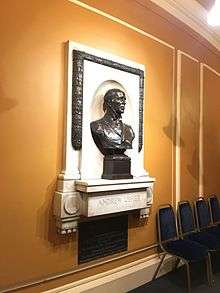Andrew Usher
| Andrew Usher | |
|---|---|
 | |
| Born | January 5, 1826 |
| Died | November 1, 1898 (aged 72) |
| Residence | Scotland |
| Citizenship | British |
Andrew Usher II (5 January 1826 – 1 November 1898) was a successful Scottish whisky distiller and blender.[1]
Background
His father, whose name he shared, Andrew Usher (1782 – 1855), was a prominent Scottish brewer who had experimented with the blending of whisky in the 1840s. He had two sons, Andrew II and John. Andrew Usher II was made a partner of Andrew Usher & Co of Edinburgh in the late 1840s. Andrew Usher II perfected the eventual blending of whisky and as such is sometimes called the 'father of Scottish whisky'.[2] The subsequent blending and mass distillation enabled whisky to grow from a drink rarely consumed outside the United Kingdom, to be one of mass export.
Andrew Usher II was one of the three founders of the North British Distillery; the other two were John Crabbie of Crabbie's Green Ginger and William Sanderson, whisky blender of Vat 69, who both served as Directors of the NB distillery.[3] Andrew Usher II was the first Chairman of the NB Distillery, serving from the start in 1885 until shortly before his death on 1 November 1898. Andrew Usher II and his brother John Usher, as partners in Andrew Usher & Co, were also the proprietors of the Edinburgh Distillery.
Philanthropy
Among his many bequests to Edinburgh and Scotland was Usher Hall, which became Scotland's premier concert hall.[4] It is recorded that he donated £100,000 to the city specifically to fund the new concert hall on 23 June 1896.[4] A bust of Andrew Usher is located in the hall at the entrance to the Grand Circle.[4] He died before the hall was completed and it was subsequently opened by his widows.[4]
Usher also played a major role in improving the fishing village and harbour of St Abbs in Berwickshire.[5] He purchased the Northfield estate on the edge of the village, enlarging and finishing the building of a countryside manor by the coastal shore in 1892.[5] He considered the local public hall inadequate and subsequently funded a new village hall and school, which was constructed in 1887 and is now occupied by the St Abbs visitor centre.[5] Usher also gave funds for the building of the local church in 1892 and the extension of the outer harbour wall in 1890.[5]
Death

He is buried in the Grange Cemetery, Edinburgh with his first wife, Elizabeth Langmuir Miller (1826-1876); his second wife, Marion Blackwood Murray (1847-1925) and several of their children. The large monument lies in the south-west corner of the original cemetery, adjacent to the opening to the western extension.
His city centre family house is now a converted pub (named the Pear Tree and Andrew Usher & Co) located near the University of Edinburgh.[6]
References
- ↑ "Whisky Promotion". Ancestry.com. Retrieved 31 October 2016.
- ↑ "The Usher Name". Andrew Usher & Company. Retrieved 31 October 2016.
- ↑ "History". North British Distillery. Retrieved 31 October 2016.
- 1 2 3 4 "History". Usher Hall. Retrieved 31 October 2016.
- 1 2 3 4 "St Abbs". The Visitor Centre. Retrieved 31 October 2016.
- ↑ "Fall and rise of Usher". The Scotsman. Retrieved 31 October 2016.